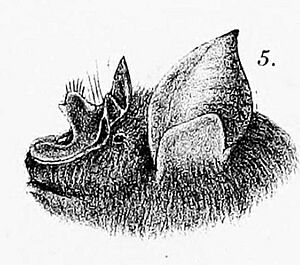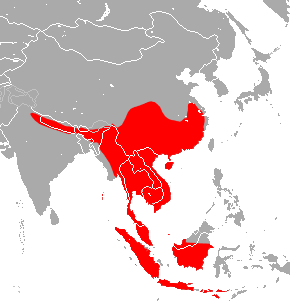Intermediate horseshoe bat facts for kids
Quick facts for kids Intermediate horseshoe bat |
|
|---|---|
 |
|
| Conservation status | |
| Scientific classification |
|
| Kingdom: | Animalia |
| Phylum: | Chordata |
| Class: | Mammalia |
| Order: | Chiroptera |
| Family: | Rhinolophidae |
| Genus: | Rhinolophus |
| Species: |
R. affinis
|
| Binomial name | |
| Rhinolophus affinis Horsfield, 1823
|
|
| Subspecies | |
|
Nine; see text |
|
 |
|
| Intermediate Horseshoe bat range | |
| Script error: The function "autoWithCaption" does not exist. | |
Script error: No such module "Check for conflicting parameters".
The intermediate horseshoe bat (Rhinolophus affinis) is a type of bat. It belongs to the Rhinolophidae family, also known as "horseshoe bats." This name comes from the special leaf-like shape on their nose. These bats are found in many places across the Indian subcontinent, southern and central China, and Southeast Asia.
Scientists consider this bat species to be of Least Concern. This means it is common in the areas where it lives. There are no major threats known that could make it disappear.
What is Taxonomy?
Taxonomy is how scientists name and group living things. The intermediate horseshoe bat was first described in 1823. This was done by an American scientist named Thomas Horsfield. The first bat specimen studied was found on the Indonesian island of Java.
Bat Subspecies
Rhinolophus affinis is divided into nine different groups called subspecies. These are like different versions of the same bat species.
- R. a. affinis
- R. a. andamanensis
- R. a. hainanus
- R. a. himalayanus
- R. a. macrurus
- R. a. nesites
- R. a. princes
- R. a. superans
- R. a. tener
These bats look and sound a bit different depending on where they live. They also use echolocation differently. This suggests that the intermediate horseshoe bat might actually be a group of very similar species. Scientists call this a species complex.
What Do They Look Like?
The intermediate horseshoe bat is a medium-sized bat. Its total body length is about 58 to 63 millimeters (2.3 to 2.5 inches). Its forearm, which is part of its wing, measures 46 to 56 millimeters (1.8 to 2.2 inches). Each bat usually weighs around 12 to 15 grams (0.4 to 0.5 ounces).
Where Do They Live?
The intermediate horseshoe bat lives across a large part of Asia. You can find them from India and China all the way through Southeast Asia.
They live in many countries, including:
The farthest east they are found is in the Lesser Sunda Islands and Java in Indonesia. These bats can live at different heights, from about 290 meters (950 feet) to 2,000 meters (6,560 feet) above sea level.
 | Tommie Smith |
 | Simone Manuel |
 | Shani Davis |
 | Simone Biles |
 | Alice Coachman |


